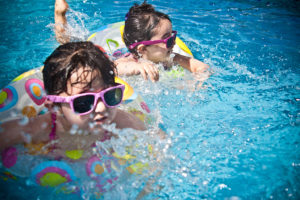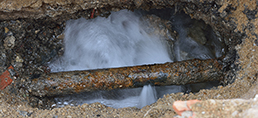
Is it safe to go in the water this summer? Not if microscopic germs like E. coli or cryptosporidium are swimming in the pool with you, U.S. health officials warn.
“These germs make people sick when they swallow water contaminated with poop,” the U.S. Centers for Disease Control and Prevention stated frankly in a news release on Thursday.
The statement accompanied a new report on 140 outbreaks of “untreated recreational water” that sickened nearly 5,000 people and killed two between 2000 and 2014 in the United States.
Many of these cases were traced to fecal matter released into pools by children or adults who weren’t following proper hygiene precautions, said a team led by preventive medicine researcher Michele Hlavsa, of Emory University in Atlanta.
About one-third of the cases occurred in public parks, and another third at public beaches, the report found. And July was the peak month—58 percent began in that month.
The way a pool or local beach usually gets contaminated isn’t pretty.
“Swimmers can be a source of fecal contamination if they have a fecal incident in the water or fecal material washes off their bodies,” the researchers explained.
Our Take
Take precautions before and after entering the pool to stay healthy. To protect yourself and others when in pools, hot tubs or water parks, the CDC advises:
- Not swimming or letting your children swim when sick with diarrhea. If crypto caused the diarrhea, wait two weeks after the diarrhea has stopped before swimming.
- Take kids for bathroom breaks. And change diapers in a changing area away from the water.
- Check inspection scores of pools, hot tubs and water parks.
- Use test strips to check if the water’s chlorine levels are proper.
- Don’t swallow pool water.
“Two common parasites that can cause diarrhea are giardia and cryptosporidium and they have been around for a long time,” said George Fogg, MD, PhD, an infectious disease specialist with Spectrum Health Helen DeVos Children’s Hospital. “We are seeing more incidences lately because we are doing a better job of detecting and reporting the cause of these intestinal disorders.”
While there isn’t currently a chemical that is both safe to use in a pool and kills some parasites, Dr. Fogg said taking normal precautions will help swimmers stay healthy.
- Avoid ingesting any pool water. “That is how it gets into your system.”
- Shower before and after swimming. “Soap can remove the spores from your skin and prevent you from inadvertently ingesting them through touch.”
- Stay out of the pool if you have a compromised immune system. “That is who we really worry about—people who have other health conditions who are particularly vulnerable to parasites.”
Dr. Robert Glatter is an emergency physician at Lenox Hill Hospital in New York City who’s seen the effects of severe gastrointestinal illnesses firsthand.
“If you develop fever, diarrhea, abdominal pain or vomiting after swimming in a lake or untreated water, it’s important to see your doctor or be treated in the emergency department,” he said. In the new report, 87 percent of illnesses were traced to bugs such as E. coli, cryptosporidium, norovirus and Shigella—all of which can be present in feces.
“Water that enters the nose while swimming in warm freshwater can place you at risk for not only diarrhea and enteritis, but parasitic and fungal infections that can spread to the brain and sinuses,” Glatter warned.
In fact, the two deaths noted in the report were linked to Naegleria fowleri, the so-called “brain-eating amoeba” that can grow in warm freshwater. Cases are very rare, but the disease is often quickly fatal.
“Wearing a nose clip or simply keeping your head above water may be helpful if you swim in lakes, rivers or areas of untreated water,” Glatter said. “Try to avoid swallowing water, since this may lead to bacterial, viral and parasitic infections. The only sure way to prevent an infection from Naegleria fowleri due to swimming is to avoid water-related activities in warm freshwater lakes or rivers.”
A small fraction of the outbreaks noted in the new report were spurred by “toxins or chemicals”—usually toxins emitted by harmful “algae blooms.” Would-be swimmers can often get a heads-up about those issues, however.
“It’s vital to obey any posted advisories in which beaches are closed for swimming,” Glatter said. Also stay away from any water that looks discolored, foamy or has a foul smell.
Of course, the best way everyone can keep water-safe this summer is to pitch in for prevention.
“If you are sick with diarrhea, stay out of the water, since swallowed water may contain enteric pathogens that can result in nausea, vomiting and diarrhea,” Glatter said.
According to the study team, parents must be especially vigilant.
That’s because outbreaks were most likely at pools or beaches “frequented by children under 5 years with no or limited toileting skills [and] without adequate, easily accessible and well-stocked hygienic facilities,” such as toilets or diaper-changing stations.
Dr. Nicole Berwald is interim chair of emergency medicine at Staten Island University Hospital in New York City. She stressed that for the millions of Americans who flock to beaches and pools this summer, the water is fine.
“These recreational activities are usually performed without hazardous outcomes,” she said. “With that said, swimmers should be aware of potential health risks so they can enjoy the summer months while protecting themselves.”
 /a>
/a>
 /a>
/a>
 /a>
/a>